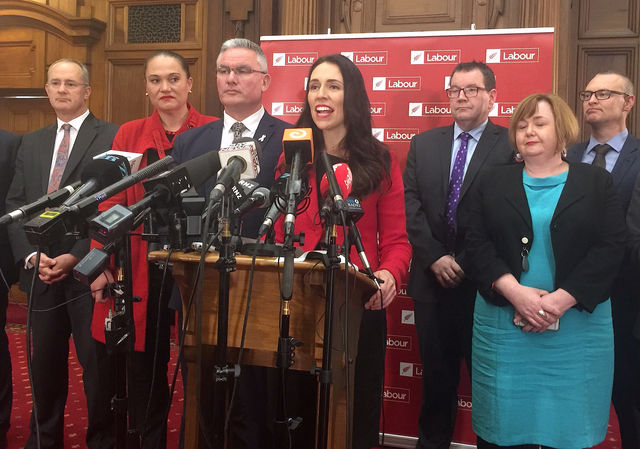- Ardern compared with young, liberal leaders like Trudeau, Macron
- Ardern leads revival in opinion polls ahead of Sept 23 vote
- Labour will likely need deal with nationalist NZ First to govern
- Ardern favours policies to slash record immigration
When Jacinda Ardern seized leadership of New Zealand's opposition Labour Party earlier this month, she quickly drew comparisons with youthful, cosmopolitan leaders like Canada's Justin Trudeau and France's Emmanuel Macron.
But despite similar social media buzz about the 37-year-old's progressive credentials, Ardern is set to take a harder line than either of those leaders when it comes to immigration, a hot-button issue for the Sept. 23 general election.
Ardern will almost certainly need to strike a deal with Winston Peters, the head of the nationalist New Zealand First Party and a staunch critic of immigration, if she is to wrest power from the conservative National Party.
Ardern, a charismatic former president of the International Union of Socialists, has tried to distance herself from Peters' rhetoric, which has included accusing Asian migrants of "imported criminal activity".
The new leader officially launched Labour's election campaign on Sunday to a packed Auckland town hall, pledging her government would be "bold", "brave" and tackle rising inequality should it win next month’s election.
But she has no plans to drop Labour policies aimed at slashing the intake of foreigners by tens of thousands per year amid a migration boom blamed for everything from unaffordable housing to stagnant wage growth and overcrowded roads.
"My focus is on making sure we have an immigration system that works for New Zealand and also gives those who are migrating to New Zealand the best opportunities and best chance possible," Ardern told Reuters in an interview.
Those plans contrast with French President Macron's announcement that he would look into opening migrant processing centres in Libya, to avoid a dangerous trip for asylum seekers across the Mediterranean Sea. Canadian Prime Minister Trudeau, meanwhile, has positioned himself as an alternative figure to U.S. President Donald Trump by touting Canadian immigration as a success story.
"LOOK AT WHAT'S HAPPENING IN THE WORLD" New Zealand's annual net migration of 72,300 is at record levels in a country of just 4.7 million people, ahead of both Britain and the United States on a per capita basis.
At the most recent census in 2013, a quarter of the population was born overseas. Post-war migration has underpinned New Zealand's economic success, but has also become a lightening rod for nationalists such as Peters, as it has elsewhere.
Though Peters is considered more centrist than international nationalist figures such as Donald Trump and Marine le Pen by most political analysts, some Labour voters are uncomfortable with the increasingly negative rhetoric around immigrants.
Yael Shochat, a longtime Labour supporter since emigrating to New Zealand from Israel in 1998, welcomes Ardern as a friend and regular customer in her Auckland restaurant.
But she has told Ardern in person and in a scathing public letter that Ardern's public linkage of infrastructure problems and immigration is misguided.
"It's a bit worrying, we're not sure we got through to her," Shochat told Reuters. "Look at what's happening around the world...people in leadership have to be careful about what they say."
Shochat said she seriously considered not voting for Ardern next month, but decided to reluctantly go ahead with her Labour vote.
Ardern says migration had "played a huge role in building the New Zealand economy and will continue to do so."
But she wants to reduce housing and infrastructure strains in Auckland where she said there were already plenty of workers, compared to provincial areas crying out for skilled labour.
"Our concern is that our immigration settings haven't been dynamic enough to differentiate between the skills gap that might exist in regional New Zealand that doesn't exist in Auckland," she said. "That's why we've started talking about creating an allowance that we can ring fence those skills gaps and try and redisperse some of that pressure away from Auckland."
The ruling National Party has also responded to jitters over migration, making it harder for low-wage workers to get skills-based visas and describing its approach to migration as "Kiwi first."
POLL SHOWS TURNING TABLES The declining fortunes of Labour's ally, the Green Party, in recent weeks has raised the likelihood New Zealand First will decide the next government in the country's mixed member proportional parliament.
Labour surged 13 points to 37 percent in a poll released last week, while the National Party dropped three points to 44 percent. New Zealand First is polling at around 10 percent while the Greens have plunged to 4 percent support.
Peters, who has in the past served as a minister in both Labour and National-led governments, has so far declined to pledge allegiance to either.
Some political analysts believe the 40-year political veteran could be drawn to a statesmanlike-role to mentor political ingénue Ardern.
"He can play some sort of role in reality or at least in perception of assisting this new force in politics and tutoring this person," said Bryce Edwards, a Wellington-based political analyst at Critical Politics. "I think that would appeal to him totally."
Peters, meanwhile, sees imitation as a flattery. "Labour, the Greens and the National Party were all for mass immigration, were all for calling New Zealand First racist," he told Reuters earlier this month. Now, "they're trying to catch up."
- Forums
- NZX - General
- News: Hard Labour: NZ's Ardern takes tougher line on immigration






